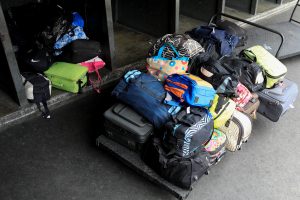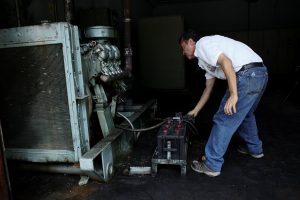
By Luc Cohen
CARACAS (Reuters) – Betsabeth Casique saved for eight months for bus tickets out of Venezuela for herself and her three children. At 1.4 million bolivars each, they are worth what she earns in a month working as a nurse.
It is less than two dollars at the black market exchange rate.
When socialist President Nicolas Maduro won re-election to a six-year term on Sunday in a vote the opposition and foreign governments called illegitimate, Casique decided to leave, first for the western city of San Cristobal and from there to Cucuta, Colombia.

Bags and suitcases are seen at a bus station in Caracas, Venezuela May 21, 2018. REUTERS/Marco Bello
“That was the straw that broke the camel’s back, what pushed me to do it faster,” Casique, 29, said while charging her cell phone outside the Aeroexpresos Ejecutivos terminal in Caracas, where she was planning to buy tickets for a bus leaving on Tuesday.
Ninety-nine people bought tickets on Monday morning for that trip, said Greberli Rojas, a passenger who displayed a handwritten wait-list she was keeping to avoid disputes between passengers trying to fit on the bus.
Rojas, a 29-year-old accountant who arrived from the town of Barlovento in Miranda state and bought her ticket early Monday, planned to spend the night at the station to avoid losing her spot.
“I’m prepared to sell coffee because us migrants have to be prepared to start from the bottom,” said Rojas, who plans to settle in Lima, Peru.
It appeared the emigration crisis Venezuela had experienced in recent years as its economy collapsed would continue since Maduro’s government was unlikely to change policies that led to hyperinflation, food and medicine shortages and rising crime.
The United Nations has estimated that nearly 1 million Venezuelans the country left between 2015 and 2017.
Over the past weekend, migrants streamed across the border, skeptical that their votes would change anything in an election many thought would be rigged. Mainstream opposition called for a boycott and turnout was 46 percent compared with 80 percent in 2013’s presidential election.
“We expected that the incumbents would win, so we decided to leave,” said Jorge Hernandez, a 23-year-old engineering student who sold his Toyota Avalon to buy tickets for himself and his mother to leave Caracas from the Rutas de America terminal on Monday morning.
He brought bread and crackers for the 36-hour trip to Trujillo, Peru, where his sister has been waiting tables for two-and-a-half months.
“This government has been in power for 18 years and things have gone from bad to worse,” he said.
(Reporting by Luc Cohen; Editing by Toni Reinhold)

